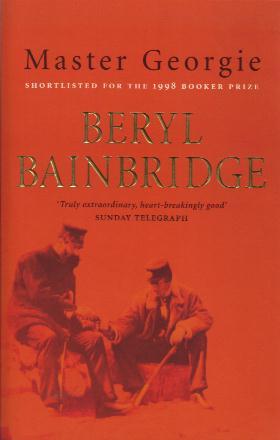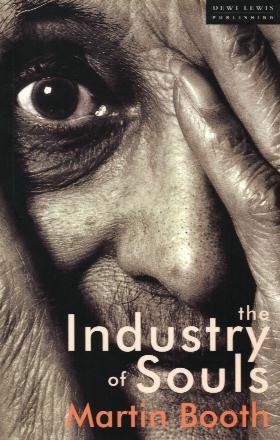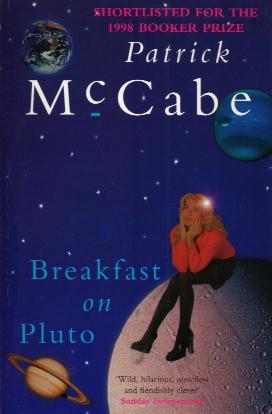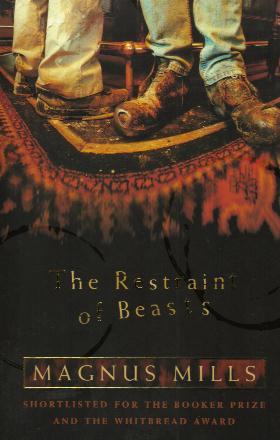
Ian McEwan
The following novels constitute the shortlist for the 1998 Booker Prize:
Notable Omissions from the 1998 Shortlist

|
Amsterdam Ian McEwan |
Dustjacket synopsis:
"On a chilly February day two old friends meet in the throng outside a crematorium to pay their last respects to
Molly Lane. Both Clive Linley and Vernon Halliday had been Molly's lovers in the days before they reached their current
emminence, Clive as Britain's most successful modern composer, Vernon as editor of the quality broadsheet, The Judge.
Gorgeous, feisty Molly had had other lovers too, notably, Julian Garmony, Foreign Secretary, a notorious right-winger
tipped to be the next prime minister.
"In the days that follow Molly's funeral Clive and Vernon will make a pact that will have consequences neither has foreseen. Each will make a disastrous moral decision, their friendship will be tested to its limits and Julian Garmony will be fighting for his political life.
"A contemporary morality tale that is as profound as it is witty, this short novel is perhaps the most purely enjoyable fiction Ian McEwan has ever written. And why Amsterdam? What happens there to Clive and Vernon is the most delicious shock in a novel brimming with surprises."
First Paragraph:
Two former lovers of Molly Lane stood waiting outside the crematorium chapel with their backs to the February chill. It had all been said before, but they said it again.
'She never knew what hit her.'
'When she did it was too late'
'Rapid onset.'
'Poor Molly.'
'Mmm.'
Poor Molly. It began with a tingling in her arm as she raised it outside the Dorchester Grill to stop a cab; a sensation that never went away. Within weeks she was fumbling for the names of things. Parliament, chemistry, propeller she could forgive herself, but less so bed, cream, mirror. It was after the disappearance of acanthus and bresaiola that she sought medical advice, expecting reassurance. Instead, she was sent for tests and, in a sense, never returned. How quickly feisty Molly became the sick-room prisoner of her morose, possessive husband, George. Molly, restaurant critic, gorgeous wit and photographer, the daring gardener who had been loved by the Foreign Secretary and could still turn a perfect cartwheel at the age of forty-six. The speed of her descent into madness and pain became a matter of common gossip: the loss of control of bodily function and with it all sense of humour, and then the trailing off into vagueness interspersed with episodes of ineffectual violence and muffled shrieking.
From the Jonathan Cape hardback edition, 1998.

|
Master Georgie Beryl Bainbridge |
Dustjacket synopsis:
"When Master Georgie - George Hardy, surgeon and photographer - sets off from the cold squalor of Victorian
Liverpool for the heat and glitter of the Bosphorus to offer his services in the Crimea, there straggles behind
him a small caravan of devoted followers: Myrtle, his adoring adoptive sister; lapsed geologist Dr Potter; and
photographer's assistant and sometime fire-eater Pompey Jones, all of them driven onwards through a rising tide of
death and disease by a shared and mysterious guilt.
"Combining a breathtaking eye for beauty with a visceral understanding of morality, Beryl Bainbridge exposes her enigmatic hero as tenderly and unsparingly as she reveals the filth and misery of war, and creates a novel of luminous depth and extraordinary intensity."
Quotes:
"Truly extraordinary, heart-breakingly good" - Sunday Telegraph
"It is hard to think of anyone now writing who understands the human heart as Beryl Bainbridge does...Master
Georgie is brief, intense, and remains seared on the mind long after reading...extraordinary" - The Times
"A novella-sized miracle of passion and war" - Ruth Rendell
"A marvellous, dark, unpredictable novel - her best yet" - Kate Kellaway, Observer
"Scintillating...This is a wonderful book: it delights in history and in the eternal vanities, foibles and
eccentricities of human nature" - Evening Standard
First Paragraph:
I was twelve years old the first time Master Georgie ordered me to stand stock still and not blink. My head was on a level with the pillow and he had me rest my hand on Mr Hardy's shoulder; a finger-tip chill struck through the cloth of his white cotton shirt. It was a Saturday, the feast of Assumption, and to stop my eyelids from fluttering I pretended God would strike me blind if I let them, which is why I ended up looking so startled. Mr Hardy didn't have to be told to keep still because he was dead.
I say I was twelve years old, but I can't be sure. I don't recollect a mother and never had a birthday until the Hardy family took me in. According to Master Georgie, I'd been found some nine years before, in a cellar in Seel Street, sat beside the body of a woman whose throat had been nibbled by rats.
From the Abacus paperback edition, 1998.

|
England, England Julian Barnes |
Dustjacket synopsis:
"As every schoolboy knows, you can fit the whole of England on the Isle of Wight. In Julian Barnes's new novel, the
grotesque, visionary tycoon Sir Jack Pitman takes the saying literally and does exactly that. Starting from the premise
that most tourists are interested only in the top attractions and are as satisfied with a replica as with the real thing,
he constructs on the island 'The Project', a vast heritage centre containing everything 'English', from Buck House to
Stonehenge, from Manchester United to the White Cliffs of Dover.
"The project is monstrous, risky and vastly successful. Indeed it gradually begins to rival 'Old' England and threatens to supersede it.
"Ferociously funny, unsparing in its attack, Julian Barnes's first novel for six years is a book about England, about the idea of England - and about the search for authenticity and truth amid the fabulation and bogusness that is 'England'."
First Paragraph:
'What's your first memory?' someone would ask.
And she would reply, 'I don't remember.'
Most people assumed it was a joke, though a few suspected her of being clever. But it was what she believed.
'I know just what you mean,' sympathisers would say, preparing to explain and simplify. 'There's always a memory just behind your first memory, and you can't quite get at it.'
But no: she didn't mean that either. Your first memory wasn't something like your first bra, or your first friend, or your first kiss, or your first fuck, or your first marriage, or your first child, or the death of your first parent, or your first sudden sense of the lancing hopelessness of the human condition - it wasn't like any of that. It wasn't a solid, seizable thing, which time, in its plodding, humorous way might decorate down the years with fanciful detail - a gauzy swirl of mist, a thundercloud, a coronet - but could never expunge. A memory was by definition not a thing, it was...a memory . A memory now of a memory a bit earlier of a memory before that of a memory way back when. So people assertively remembered a face, a knee that bounced them, a springtime meadow; a dog, a granny, a woollen animal whose ear disintegrated after wet chewing; they remembered a pram, the view from a pram, falling out of a pram and striking their head on an upturned flower-pot which their brother had placed to climb up on and view the new arrival (though many years later they would begin to wonder if that brother had not wrenched them out of sleep and dashed their head against the flower-pot in a primal moment of sibling rage...) They remembered all this confidentially, uncontradictably, but whether it was the report of others, a fond imagining, or the softly calculated attempt to take the listener's heart between finger and thumb and give it a tweak whose spreading bruise would last until love had struck - whatever its source and its intent, she mistrusted it. Martha Cochrane was to live a long time, and in all her years she was never to come across a first memory which was not in her opinion a lie.
From the Jonathan Cape hardback edition, 1998.

|
The Industry of Souls Martin Booth |
Dustjacket synopsis:
"The Industry of Souls is the story of Alexander Bayliss, a British citizen arrested for spying in the Soviet
Union in the early 1950s. Presumed dead by the British Government, he survives 20 years in a Soviet labour camp. Eventually
freed from the gulag in the 1970s, he finds he has no reason to return to the West - he has become Russian in
everything but birth. He finds his way to the home of his best friend at camp - Kirill. Taken in by Kirill's childless
daughter and her husband he eventually becomes a local schoolmaster - much loved by all the village.
"Now, on the day of his 80th birthday Russia is changed. Communism has evaporated. In the aftermath, information has come to light that he is still alive. The story moves from this day to his past in the camp and his life in the village. And it ends with him having to make a choice, perhaps for the first time in his life..."
Quotes:
"Booth is the Zen master of modern fiction" - Books Magazine
"He writes like an angel" - Mail on Sunday
"Booth has been one of our most under-estimated writers for years: it is time for him to come into his kingdom" - Sunday
Telegraph
First Paragraph:
It was only this morning and yet it seems much longer ago. I might have lived a week since dawn.
Perhaps it is that, in my dotage, the god who controls time has seen fit to play the fool with me either by inexorably slowing down the clock or awarding me more hours than he does my fellow man, more than are my fair due. Perhaps the truth is that he is a sympathetic god who knew that, today of all days, I needed more time.
I woke as I always do, just after six, regardless of whether the summer sun is up and the birds contesting the day, or it is still night with the land clutched in winter's Artic fist, and lay quite still. Usually, this is a quiet time when I empty the jug of my mind in readiness for whatever the coming day may pour into it. Yet, this morning, I came to consciousness with an inch or two of life's murky liquid already sloshing about in the bottom, and remained in my bed cogitating upon it: it had already occupied some sleepless hours of the night.
From the Dewi Lewis paperback edition, 1998.

|
Breakfast on Pluto Patrick McCabe |
Quotes:
"Distressing and hilarious, satirical and bathetic, over the top and understated, Breakfast on Pluto conveys in the
manner of Roy Lichtenstein matter that wouldn't be out of place in the paintings of Hieronymous Bosch." - George O'Brien,
The Irish Times
"The tragi-comic timbre of Beckett laced with Alex the Droog." - Paul Sayer, Literary Review
"McCabe manages to say more about Northern Ireland's recent history then many historians have been able to." - Antonia
Logue, The Guardian
"McCabe, through Pussy/Patrick, is sharp as a recording angel on conspiracy and collusion." - Hayden Murphy,
Glasgow Herald
"Breakfast on Pluto is hilarious, outrageous, but disturbing too." - Books Ireland
"Set against a kaleidoscope of colour and music, Patrick McCabe delivers a Molotov cocktail of gender-bending, random
violence and mental mayhem...Irreverence pounds through McCabe's veins. And with Pussy Braden, he has a perfect
vehicle for his satire..." - Marion McKeone, The Sunday Business Post
"Dysfunctional Ireland in all its glories is here, with hunour of the blackest hue, madness and violence, hopelessly
randy priests, dodgy politicians, a grand gallery of misfits culminating in McCabe's here in Breakfast on Pluto,
Patrick "Pussy" Braden, the transvestite prostitute from the village of Tyreelin'" - Ronan Farren, Sunday
Independent
"He is the fortunate possessor of a savage and unfettered imagination; his books...dissect life's miseries with a gleaming
comedic scalpel" - Erica Wagner, The Times
"It finds humour in places that other writers are afraid to look for it" - David Robson, Sunday Telegraph
"This is a savagely funny and authentically tragic novel of an Ireland in unhappy transition and beneath McCabe's perfectly
delivered black comedy lies an angry heart" - GQ Magazine
"Without drawing breath, McCabe mingles camp comedy with brutality, making Breakfast on Pluto both funny and
deeply shocking" - Maxim
"Told with irresistible zest, brio and gaiety...McCabe's brilliant, startling talent is to make enchantingly dashing
narratives out of the most ghastly states of mind imaginable, and to induce compassion for lives which seem least to
invite it...He is a dark genius of incongruity and the grotesque" - Hermione Lee, Observer
First Paragraph:
Although I'm afraid I don't get too many clients these days! I can just imagine the reaction of my old acquaintances if they saw me now, sitting here in my silly old coat and headscarf - off out that door and down the Kilburn High Road with the lot of them, no doubt! Still, no point in complaining - after all, every beauty has to lose her looks sometime and if the gold-digging days of poor old darling poo poo puss are gone for ever, well then, so be it. I ain't gonna let it bother me, girls! Just give me Vic Damone, South Pacific, plus a yummy stack of magazines and I'll be happy, as once more I go leafing through the pages of New Faces of the Fifties, Picturegoer, Screen Parade, gaily mingling with the stars of long ago.
From the Picador paperback edition, 1999.

|
The Restraint of Beasts Magnus Mills |
Quotes:
"A demented, deadpan comic wonder " - Thomas Pynchon
"Extremely unusual, finely crafted and funny...Tam and Richie are two itinerant Scots fencers and would-be heavy rockers
with a predeliction for beer, distressed denim and long silences. Supervising their work is a task that the narrator
understandably regards with some trepidation, particularly after the boss's dramatic announcement that "Mr McCrindle's
fence has gone slack". The three are duly dispatched to the McCrindle farm, where they finish off the work...then off to
England where, after rain sodden days bashing in fence posts, they wolf down baked beans in their shared squalid
caravan and spend their evenings and their hard-earned cash in the local pub. Things become more complicated when they
encounter the Hall brothers - butchers, fencers and local heroes...Shot through with farcical understatement, ironic and
melodramatic climaxes and highly idiosyncratic comic motifs, the novel casts a sharp, merciless eye on the vagaries of
contract employment and the work/drink/debt cycle that defines the lives of so many." - Christina Patterson,
Observer
"Mills's first novel really is good...The terseness of his vocabulary produces and effect that is oblique and elliptical,
yawning with sinister implication, in a manner which may be called kafkaesque...a forceful and original first novel, clever
and funny and rewardingly strange." - Jenny Turner, Independent on Sunday
"A heaving cauldron of black humour...I can guarantee that if you buy this book you'll never look at a stretch of high-tensile
agricultural fencing in quite the same way ever again." - Peter Carty, Time Out
"Worth shouting about...A comedy which is as black as a pint of Guinness and as dry as a salted peanut" - Harry Ritchie,
Mail on Sunday
First Paragraph:
'I'm putting you in charge of Tam and Richie,' said Donald. 'They can't go to England on their own.'
'No, I suppose not.''We'd never know what they were getting up to.'
'No.'
'So you can take over as foreman from today.'
'Right.'
He allowed me a few moments to absorb the news, then asked, 'Are you finding it a little hot in here?'
'Just a little, yes,' I replied.
'You should have said.' Donald rose from behind his desk and moved to the skirting board, where a radiator pipe emerged. He turned a stop-tap several times, clockwise, before settling again in his chair.
'These things can be controlled,' he remarked. 'Now, are there any questions?'
He sat back and waited. I knew the sort of questions Donald expected me to ask, but I couldn't think of any. Not with him examining me from behind his desk the way he did. At the moment only one obvious question came to mind.
'Why me?'
From the flamingo paperback edition, 1999.
Notable Omissions from the Shortlist:
"Eucalyptus", Murray Bail (winner of the 1999 Miles Franklin Award, and winner of the 1999 Commonwealth Writers Prize)
"Trumpet", Jackie Kay (winner of the 1998 Guardian Fiction Prize)
This page and its contents are copyright © 2002-05 by Perry Middlemiss, Melbourne, Victoria, Australia.
Last modified: October 18, 2005.